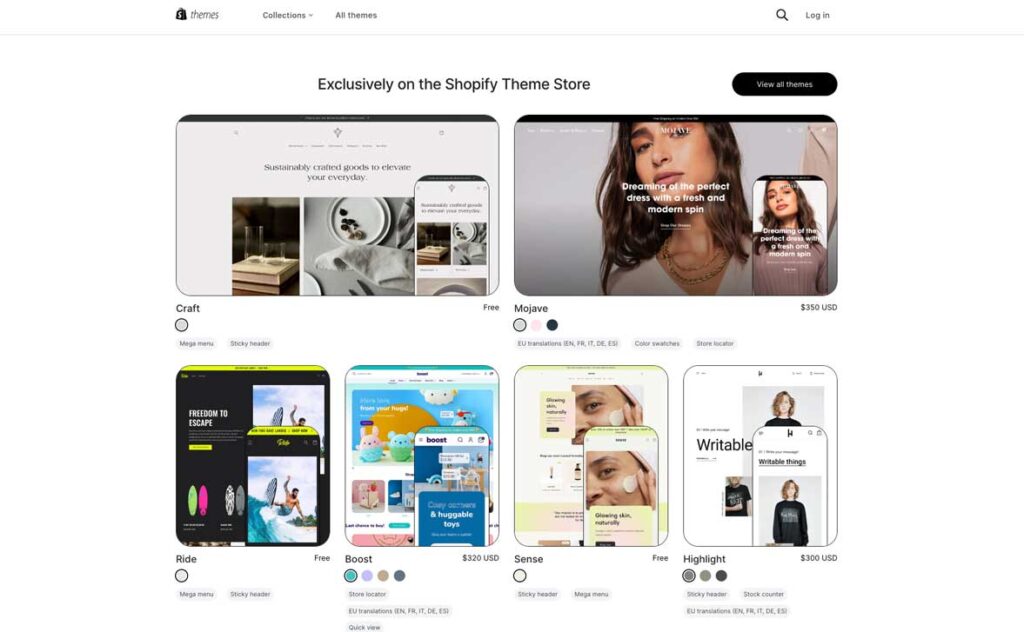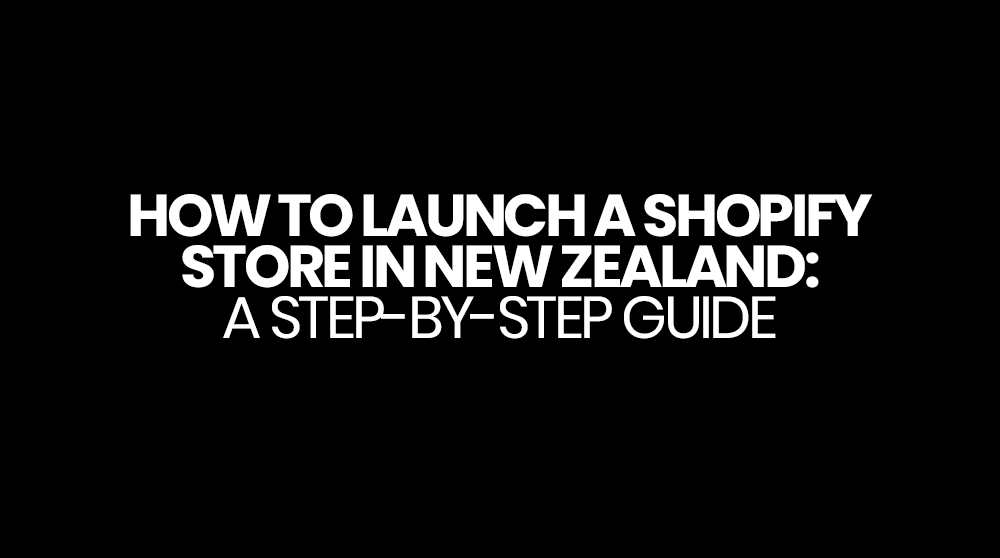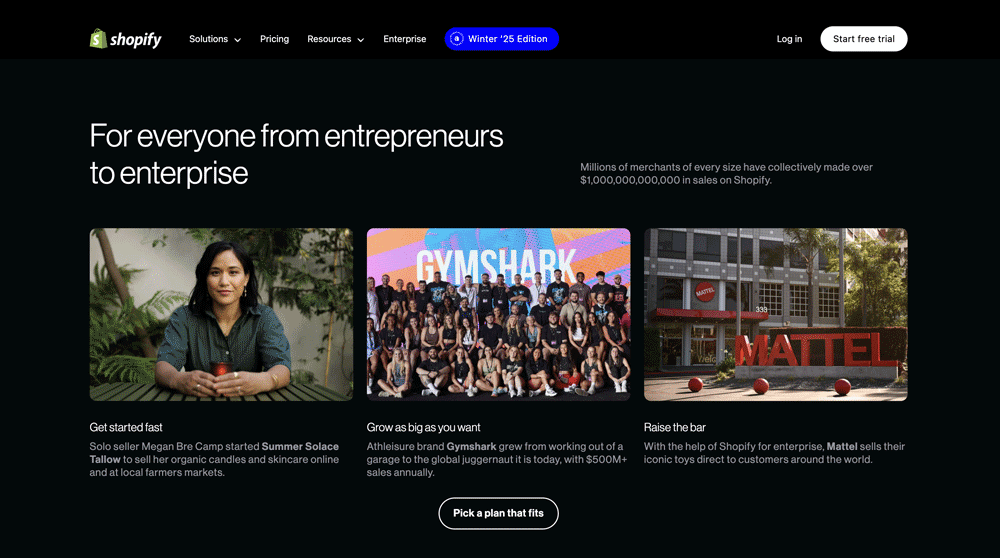It is important to know how much it costs to launch a new Shopify store and the ongoing costs before you begin the process. Initially, several factors come into play, these include the project’s complexity, whether this is a new website build or a migration from an existing CMS, if you will hire a developer, and the specific requirements of the store. Here’s an overview of the potential costs involved:
1. Shopify Subscription
To kickstart your Shopify store, you’ll need to subscribe to one of Shopify’s pricing plans. These plans range from $29 to $299 per month, (remember Shopify charges in USD) depending on the features and functionality you require. The subscription cost covers hosting, security, and basic e-commerce features provided by Shopify. When you set up your store you will be given a free trial period before you will need to start paying your monthly fee. This immediate cost is often overlooked when launching a shopify store. You can move up or down plan tiers pretty easily, so for new stores the ‘Basic’ plan should suffice.
**TIP ** If you work with a shopify developer from the beginning you will be able to utilise their access to unlimited free development – so you can take your time developing and you will only need to pay once you are ready to launch your store.
2. Developer Fees
If you choose to engage with a web developer or shopify expert to assist with the setup and customisation of your Shopify store, their fees will add to the overall cost. Developer rates can vary significantly based on experience, expertise, and location. In New Zealand, developers typically charge between NZD $80 and $200 per hour. The total development cost hinges on the project’s complexity, including theme customisation, app integrations, and any additional functionalities required. If you are well prepared and have spent time planning your website – including planning a site map, creating the content of copy, having brand guidelines ready and preparing imagery assets you will significantly reduce the back-and-forth time with a developer or designer.
Some developers will only build custom themes which significantly increases the cost of a new store, some will use themes from the Shopify theme store. Using non-custom themes ensures you will be able to integrate with existing (and future APPs) and will also make updating easier.
3. Theme Selection
Shopify offers a wide selection of themes, including free and paid options. While free themes provide a solid starting point, a paid theme may be necessary for a more unique and tailored design or a specific functionality which is not available in the free theme. Paid themes usually range from $150 to $300 USD, with premium themes offering advanced features and pricing reaching $500 USD or more. It is my advice when selecting a theme to spend some time browsing the Shopify theme store and to make sure you future proof our store by selecting a Shopify 2.0 theme.

4. Customisations and Add-ons
If you have specific design requirements or functionality needs not met by the chosen theme, additional customisations or app integrations may be necessary. If your business does not have Brand guidelines you may find yourself overwhelmed by colour, font and style choices. Brand Guidelines will also ensure your website matches the current business’ current customer facing brand and messaging. Customisation costs depend on complexity and implementation time. Estimates range from a few hours to several thousand dollars, depending on the extent of modifications. Most developers will offer free advice if you are unsure about the complexity of your store requirements.
5. APPs and Extensions
Shopify’s App Store provides a wide variety of apps and extensions to enhance store functionality. Costs for these apps can vary, with some being free while others have monthly or one-time fees. On average, budgeting between $50 and $200 per month for app expenses is reasonable, depending on the specific apps you choose to integrate. It is best to talk to an expert to determine what functionality your require and to help budget your ongoing monthly expenses if you may need an App or plugin. This cost can be significant and multiple Apps can add up quick – this cost is unexpected when launching a shopify store. My advice for clients is to look at the monthly cost of the APP, if you can cover that cost with extra sales or saving on your time or labour then go for it.
The biggest investment when setting up an eCommerce store is your time – the secret to successful shopify stores is to continuously automate labour-intensive tasks and ensuring you have enough time to focus on business growth.
In this blog I recommend my top 5 APPs for New Zealand Shopify Stores.
6. Ongoing Maintenance & Support
After launching your store, ongoing maintenance, updates, and support may be required. This could include tasks such as theme updates, app maintenance, product additions, or content changes. Ongoing maintenance costs vary based on complexity and frequency. Some developers offer fixed monthly rate maintenance and support packages, while others charge hourly fees for ad-hoc support.
Please note that the above cost estimates are approximate and can vary based on individual circumstances and project requirements. Consulting with developers and obtaining detailed quotes specific to your needs will yield a more accurate estimate of costs. It is best to reach out to a range of Shopify experts and ask for a quote on your project – this exercise alone will give you an indication of the priorities of a business and their response times.
7. Annual Domain Name Ownership
Shopify nows offers the ability to purchase a domain name from within the platform itself – you can also use a domain name purchased from a third party provider like Freeparking or Crazy Domains.
Launching a new Shopify store with the help of an expert will significantly reduce the stress and hassle of setting up your store without help. It also provides the advantage of professional guidance on a range of set-up options. By careful planning and budgeting, you can establish a successful online presence aligned with your business goals.
If you would like to know why I recommend Shopify to existing business owners read this blog.






